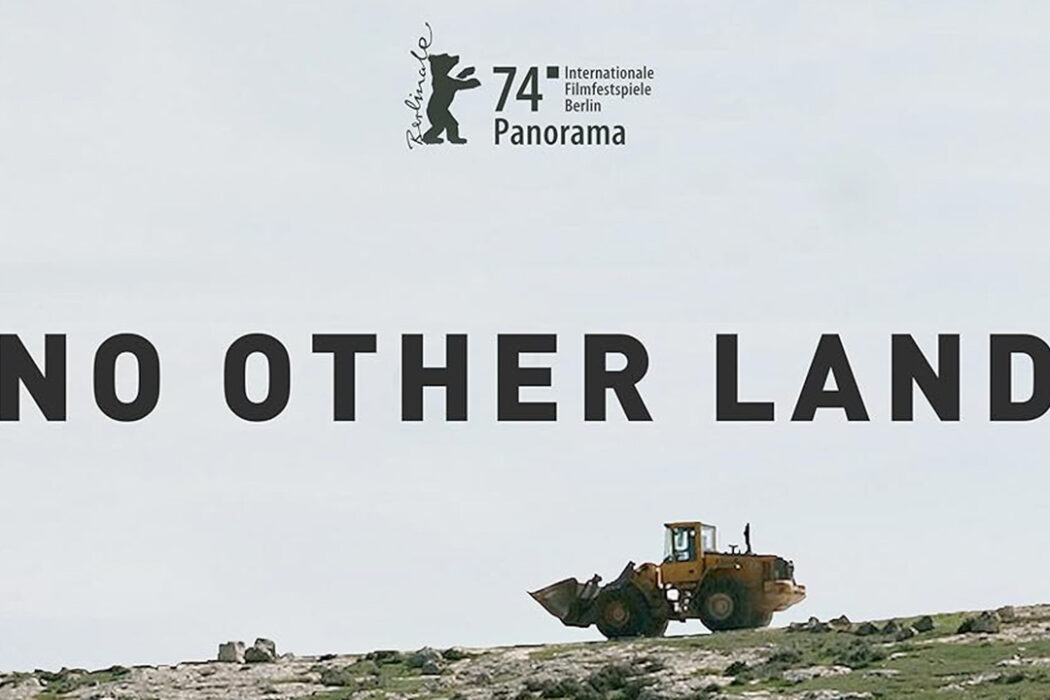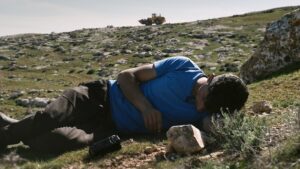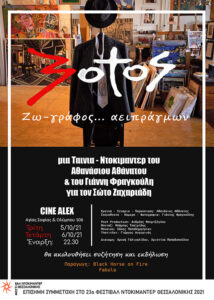NO ANOTHER LAND
Νοέ 03, 2024 Κινηματογράφος 0

FILM CRITICS
A DRAMATIZED DOCUMENTARY
No another land: Giannis Fragoulis writes
We saw the film “No other land” at the Pavlos Zannas Cinema in Thessaloniki. A dramatized documentary that develops the problems regarding the coexistence of Israelis and Palestinians, as well as the rights of the latter to the land of their ancestors. It will be interesting to see exactly where and how the dramatization develops in this film, the boundaries between fiction and documentary, which – again – are blurred.
No another land: The story
A film made by two young activists, the Palestinian lawyer Basil Adra and the Israeli journalist Yuval Abraham. They lived together, in a place, a miniature of the Israeli-Palestinian conflict, a war that has been going on for years, to show on the one hand what is happening, on the other hand that there is room for understanding between the two peoples. Before the recent development of the war. They are trying to document the struggle of the inhabitants, in this Palestinian land, to save their settlement from the repeated attempts by the Israeli army to demolish it completely. A truth that is making its own struggle to be heard, as humanity, as desperate, heroic and collective resistance, confronts totalitarianism and a militaristic machine of repression and murder.
The film is a collective product. Four directors who wrote the screenplay, also did the editing. We can say that the film begins as a reportage. Very soon we see two of the filmmakers involved in the narrative, creating a first form of dramaturgy. They talk about what is happening, but they put their personal experience into this linear narrative. This is where the dramaturgy begins. The camera records what happens without requiring a beautiful sequence of images. It moves arbitrarily, it moves by showing the movement that the human reporter makes, thus putting the viewer into the event, the attack of Israeli soldiers and the defense of Palestinians.

No another land: The shock
We have, then, the second degree of dramaturgy. The viewer experiences more and more of the events as the documentary becomes intertwined with the acting of the actor-actress. In this way, those who watch the film go from being passive spectators to becoming actors in a narrative that conveys what happened before the Hamas attack. At this point, the stage space leaves the screen and opens up to the entire room. More importantly, it provides stimuli so that, through each viewer’s ideological filter, it creates ideological narratives that will create other narratives in the film’s post-screening
We are shocked by what has happened. We realize that we have been transported into the past, five years ago, we can now look back to the present. We understand what has happened and what is happening, we see what is now the driving force behind these events. We are able to form an opinion about the Israeli-Palestinian war. We are shocked by the power of the image. We reach the end. A few shots put us at the withdrawal of the Palestinians from the registered land, since, now, their lives are in danger. We realize that some – many or few – of those we have seen in the film may, at this moment, have died from Israeli fire. We are indignant at the brutal Israeli violence practiced on civilians. Add to all this the attacks, with guns, by Israeli settlers, and we have a picture of an inhuman catastrophe.
No another land: Are terrorists?
How much strength can the Palestinians have to endure, for so many years, this violence, the massacres, the destruction of their lives? The mind of man somewhere cannot imagine any more. We arrive at the picture of despair. We refuse to visualize this image in our own society, because we will reach the realm of paranoia. Then we understand that it is in this paranoid space that the Palestinians have been living for so many years, since 1948. We also realise that if the Palestinians are terrorists, then so were the Greeks when they defended their lands, because the Palestinians are doing exactly the same thing.
The film describes, in an indirect way, the reality, what is behind it, the lie of politics that presents every Palestinian as a potential terrorist. The film implies, as cinema should do. It is a masterful narrative that has rightly received so many awards that, perhaps, it has stirred up and sparked a public reaction. Palestinian cinema exists, it continues with vigor in its interesting history. It is strengthened by the passions of the Palestinian people. It is another weapon in the struggle of the Palestinian people. A film that should be seen wherever it plays!
NO ANOTHER LAND
Directed by Yuval Abraham, Basel Adra, Hamdan Ballal, Rachel Szor
Screenwriter: Yuval Abraham, Basel Adra, Hamdan Ballal, Rachel Szor
Photography: Rachel Szor
Editing: Yuval Abraham, Basel Adra, Hamdan Ballal, Rachel Szor
Music: Julius Pollux, Rothlaender
Sound: Morten Fagelund, Bård Farbu, Boris Parunov
Producers: Fabien Greenberg, Bård Kjøge Rønning
Actors: Yuval Abraham (same), Basel Adra (same)
Production year: 2024
Production country: Palestine, Norway
Language: arabic
Colour: colour
Genre: dramatized documentary
Duration: 92΄
More informations about the movie here.
Σχετικά άρθρα
-
 ΕΠΙΣΤΡΟΦΗ ΣΤΗΝ...
ΕΠΙΣΤΡΟΦΗ ΣΤΗΝ...Μαρ 26, 2025 0
-

-

-
 GIANNIS IN THE CITIES
GIANNIS IN THE CITIESΜαρ 01, 2025 0
Στην ίδια κατηγορία
-
 Ο ΓΥΡΟΣ ΤΟΥ ΚΟΣΜΟΥ...
Ο ΓΥΡΟΣ ΤΟΥ ΚΟΣΜΟΥ...Απρ 02, 2025 0
-
 ΜΙΑ ΓΥΝΑΙΚΑ...
ΜΙΑ ΓΥΝΑΙΚΑ...Μαρ 29, 2025 0
-
 ΦΕΣΤΙΒΑΛ ΓΑΛΛΟΦΩΝΟΥ...
ΦΕΣΤΙΒΑΛ ΓΑΛΛΟΦΩΝΟΥ...Μαρ 25, 2025 0
-

Αναζήτηση
-
 WONDER WOMAN
WONDER WOMANΙούν 09, 2017 138
-
 ΠΑΙΔΙΚΗ ΣΚΗΝΗ
ΠΑΙΔΙΚΗ ΣΚΗΝΗΟκτ 12, 2014 2
-
 ΚΛΗΡΩΣΗ ΠΡΟΣΚΛΗΣΕΩΝ
ΚΛΗΡΩΣΗ ΠΡΟΣΚΛΗΣΕΩΝΜαρ 22, 2014 2
-
 ΔΥΟ ΜΕΡΕΣ, ΜΙΑ ΝΥΧΤΑ
ΔΥΟ ΜΕΡΕΣ, ΜΙΑ ΝΥΧΤΑΝοέ 13, 2014 2
-
 ΑΧΙΛΛΕΑΣ ΨΑΛΤΟΠΟΥΛΟΣ
ΑΧΙΛΛΕΑΣ ΨΑΛΤΟΠΟΥΛΟΣΝοέ 09, 2014 2
-
 ISTABUL FILM FESTIVAL
ISTABUL FILM FESTIVALΜαρ 08, 2014 2
-
 Ο ΓΥΡΟΣ ΤΟΥ ΚΟΣΜΟΥ ΤΟΥ ΜΙΚΡΟΥ ΓΚΡΙΖΛΙ
Ο ΓΥΡΟΣ ΤΟΥ ΚΟΣΜΟΥ ΤΟΥ ΜΙΚΡΟΥ ΓΚΡΙΖΛΙΑπρ 02, 2025 0
-
 ΗΛΙΟΣ ΜΕ ΔΟΝΤΙΑ
ΗΛΙΟΣ ΜΕ ΔΟΝΤΙΑΑπρ 02, 2025 0
-
 ΠΑΓΚΟΣΜΙΑ ΗΜΕΡΑ ΘΕΑΤΡΟΥ
ΠΑΓΚΟΣΜΙΑ ΗΜΕΡΑ ΘΕΑΤΡΟΥΜαρ 29, 2025 0
-
 ΜΙΑ ΓΥΝΑΙΚΑ ΕΞΟΜΟΛΟΓΕΙΤΑΙ
ΜΙΑ ΓΥΝΑΙΚΑ ΕΞΟΜΟΛΟΓΕΙΤΑΙΜαρ 29, 2025 0
-
 ΕΠΙΣΤΡΟΦΗ ΣΤΗΝ ΠΑΤΡΙΔΑ
ΕΠΙΣΤΡΟΦΗ ΣΤΗΝ ΠΑΤΡΙΔΑΜαρ 26, 2025 0
-
 ΦΕΣΤΙΒΑΛ ΓΑΛΛΟΦΩΝΟΥ ΚΙΝΗΜΑΤΟΓΡΑΦΟΥ
ΦΕΣΤΙΒΑΛ ΓΑΛΛΟΦΩΝΟΥ ΚΙΝΗΜΑΤΟΓΡΑΦΟΥΜαρ 25, 2025 0

Δείτε το τρέιλερ της ταινίας μας, που συμμετέχει το Φεστιβάλ Ντοκιμαντέρ Θεσσαλονίκης.
SOTOS, EVERLASTING PAINTER (TRAILER)
Youtube
Επικοινωνήστε
ΓΙΑΝΝΗΣ ΦΡΑΓΚΟΥΛΗΣ
Email: info@filmandtheater.gr
Τηλ: (+30) 6974123481
Διεύθυνση: Ιωαννίνων 2, 56430, Σταυρούπολη Θεσσαλονίκη
![]()
| Δ | Τ | Τ | Π | Π | Σ | Κ |
|---|---|---|---|---|---|---|
| 1 | 2 | 3 | 4 | 5 | 6 | |
| 7 | 8 | 9 | 10 | 11 | 12 | 13 |
| 14 | 15 | 16 | 17 | 18 | 19 | 20 |
| 21 | 22 | 23 | 24 | 25 | 26 | 27 |
| 28 | 29 | 30 | ||||

